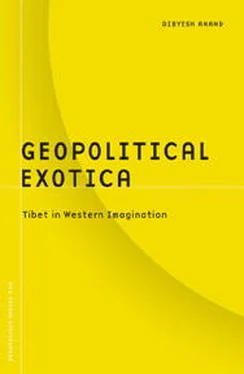The Convention has been signed… In the Convention the British Government have been careful to avoid interfering in the smallest degree with your religion. They have annexed no part of your country. They have made no attempt to interfere in your internal affairs. They fully recognise the continued suzerainty of the Chinese Government… You have found us bad enemies when you have not observed treaty obligations and shown disrespect to the British Representative. You will find us equally good friends if you keep the present treaty and show civility. (Ibid., 271)
Tibet was forcefully brought into the international arena. Campbell points out in a memorandum dated 5 April 1906 that the Amban representing the Qing imperial authority refused to sign the Anglo-Tibetan Convention in 1904 on the ground that it "robbed China of her suzerainty" and because the Chinese objected to the British "making any Convention with Tibet" (IOR: L/P &S/18/B157 1906, 178). In fact, Britain signed an Adhesion Agreement with China in 1906 as a follow-up to the Lhasa Convention.
This forced opening of Tibet had significant geopolitical impact as it led to an increased Chinese awareness of vulnerability at its "backdoor" (see Liming 1994; Tuttle 2005). Ironically, the Chinese central government sought to establish firm control over Tibet (first during the immediate aftermath of British invasion, and then from 1949 onward), ignoring its own history of a more loosely defined relationship with Tibet. In an official memorandum titled "Events in China, Korea and Siam, 1908," the change in Chinese stance is recognized unambiguously: "One clear result of her recent policy respecting the Dalai Lama is that China has officially proclaimed herself the Sovereign Power of Thibet, and can no longer evade the full responsibilities of its government" (in Nish 1995, 291). One can therefore see the Sino-Tibetan 1951 Seventeen Point Agreement and the events since then as completing what had been implemented initially in 1908 but was interrupted due to a civil war within China. The Dalai Lama's pleas for help from the British against new aggressive Chinese invasion were not accommodated, even though he appealed to the paternal aspect of British imperialism:
At such a time, when a big and powerful nation is trying to swallow up a smaller and weaker nation, we cannot help appealing to other powerful nations for aid and assistance, which the law of nations should make you feel bound to grant us, being impelled by regard for the duty imposed by the dignity, power and justice of your Mighty Empire. (IOR: L/P &S/10/150 2750 5-7 1908, 24)
However, the collapse of the Qing Imperial dynasty and internal crisis in China offered Tibet the opportunity to remove Chinese troops and establish a state free of Chinese political dominance. Even though the Lamaist state (1913-51) enjoyed de facto independence, there was no serious attempt to recognize it as independent.
Writing the "Chinese Suzerainty-Tibetan Autonomy" Formula
The British throughout the first part of the twentieth century stuck to the formula-Chinese suzerainty-Tibetan autonomy. In a memorandum of 17 August 1912, the British government clarified its stance: "While recognising the Chinese suzerainty, they were not prepared to admit the right of China to interfere in the internal administration of Tibet" (Foreign Office 1920, 41). Thus, "Outer Tibet would become an autonomous state under Chinese suzerainty and British protectorate" (ibid., 43).
The desire not to let support for Tibetan autonomy be interpreted as support for Tibetan independence is reflected in a letter of the India Office dated 11 July 1912 clarifying the British position on Tibet. It was modified internally before being presented to the outside world and stated:
(1) His Majesty's Government, while they have formally recognised the "suzerain rights" of China in Tibet, have never recognised, and are not prepared to recognise, Chinese sovereignty over that country.
(2) H. M.'s Govt. does not admit the right of China to intervene actively in the internal administration of Tibet. (IOR: L/P &S/10/265 1912, 47) [51]
Even when Morley was projecting the British as an "honest broker" in the Simla Talks (BOD MS Asquith 93 1913, 235), the British did not really care about the suzerainty-sovereignty issue so long as their interests were being met. In a secret memorandum dated 3 December 1924, J. P. Gibson made it clear:
The Tibetan desire to come to a permanent settlement with China is reasonable; but I doubt whether the Govt of India will allow Major Bailey to say that they will approach the Chinese Govt at the first favourable opportunity… so long as no Chinese attack is made on the Tibetan frontier, we would much prefer to let sleeping dogs lie. (IOR: L/P &S/10/718 1917, 74; emphasis added).
As Willoughby pointed out, Chinese "suzerainty (however shadowy) has been constantly admitted by us" (1924, 199). Colonel Weir's recommendation to make "friendly overtures" to China to secure at least "semi-independence" for Tibet was rejected because, as a British Indian bureaucrat cautioned in 1929, there was the "danger of China being baited into action" if "we flaunt our connection with Tibet in her eyes" (IOR: L/P &S/10/1113 1924, 15, 151). Of course, this simple British policy formula was a contested one. There were tensions between British India emphasizing Tibetan autonomy and British Home government in London exercising caution under the influence of Foreign Office (see McGranahan 2003; McKay 1997; Palace 2005). But even pro-Tibetan British officials, who tried to create a sense of nationalism among Tibetans (see McKay 2001), were careful in not encouraging Tibetan assertion of de jure independence. Chapman wrote in 1940, "We do not want to encourage the Tibetans to become once more a warlike nation; but in these days a country must be able to defend itself, and it has always been our policy to assist Tibet to maintain her position as an independent autonomous State under the nominal suzerainty of China" (1992, 110). In a letter dated 23 March 1912, the Viceroy had argued that for the security of British India the "geographical position of Tibet renders it absolutely necessary [that the] country should continue [to be] kept in state of political isolation" (IOR: L/P &S/10/265 1912; emphasis added). Here, Exotica Tibet was a good ally for the British imperial policy. A "forbidden kingdom," the "mysterious Tibet," and "closed Tibet"-these representations suited British interests for they effectively depoliticized the British imperial writing of Tibet's geopolitical identity in ambiguous terms. Ambiguity of geopolitical Tibet, nurtured by Exotica Tibet, was an asset for the British imperial policy.
Britain found the scenario of effectively independent Tibet coupled with British international rhetorical commitment to Chinese suzerainty convenient and avoided any change to this status quo so as not to offend China. For instance, in February 1917 in response to the India Office's letter demanding a vigorous protest at the inclusion of Tibet in the Chinese parliament, the Foreign Office wrote on behalf of Balfour:
The Chinese Government are extremely sensitive on the subject of the Tripartite Convention of 1914. That they have any intention of signing that instrument there is no reason to believe nor do His Majesty's Government possess at the present moment any means of forcing them to do so. It would therefore appear that a protest so strongly worded as that suggested would serve no purpose but would, on the other hand, produce extreme irritation in the Chinese Government and Parliament at a moment when China is particularly well disposed towards this country and is even contemplating throwing in her lot with the Allied cause. (IOR: L/P &S/11/68 1913; emphasis added)
As a stable government in China emerged with the communist victory and the British withdrew from India, the "Chinese suzerainty-Tibetan autonomy" formula had reached a dead end. As pointed out earlier, China since the start of the twentieth century had always maintained its sovereignty over Tibet, and now it was in a military position to enforce it and "liberate" Tibet. The British, with the end of the empire in India, no longer conceptualized Tibet as strategic. India, with its anti-imperialist nationalism, saw Tibet as a remnant of British imperialism in the region (Norbu 1997). The belated Tibetan attempts to gain international support for a recognition of their independent status in the late 1940s came to nothing (see Shakya 1999; see also Fleck 1995) as "Tibet's" geopolitical identity got translated from suzerainty-autonomy to sovereignty-autonomy. Sautman argues that there is nothing exceptional about the Tibetan case, for "long suzerainty provides the basis for territorial sovereignty in relation to other states" (2002, 93). Whatever the international rights and wrongs of this translation, it is clear that the use of the modern conception of sovereignty was new and alien to traditional Sino-Tibetan relations (see Sperling 2004).
Читать дальше












